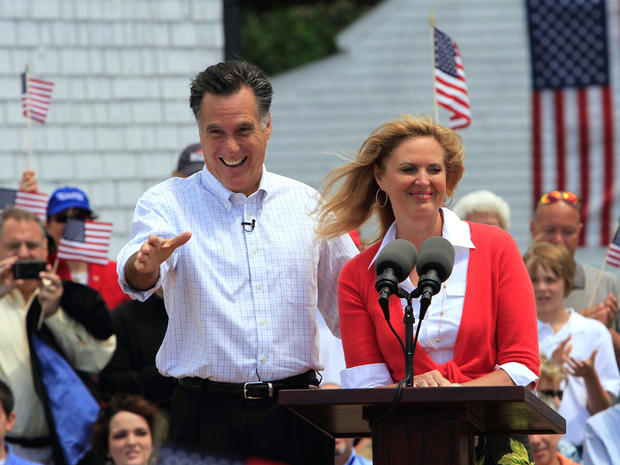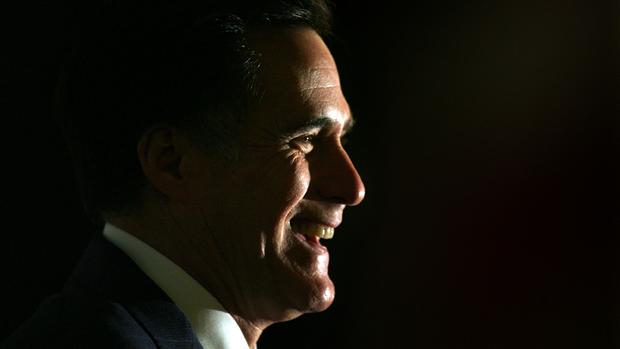With a slow economy, can Mitt Romney's pitch work?
This post originally appeared on Slate.
Mitt Romney was once a businessman. If you paid no attention to his campaign except to absorb this fact, the Romney team would probably be OK with that. The one thing Romney wants you to know is that he means business.
Naturally, then, he announced his campaign Thursday at the head of a vast blond wood conference table, in a gray suit with two Mont Blanc pens. No: He appeared in shirtsleeves with no tie at a chili cookout. On a farm. This disconnect is a problem, argues Republican strategist Mark McKinnon, who says the no-tie approach exacerbates questions about Romney's authenticity. (Don't mingle with plows when your true love is PowerPoint.) But that's not quite right, either. For a candidate trying to remind voters of his CEO past, the 1990s-era "casual Friday" uniform may actually qualify as authentic.
Romney has nearly 25 years of business experience. In 1984, he was one of the founders of Bain Capital, where he helped to turn around companies. In 2002, he helped to turn around the debt-ridden Winter Olympics in Salt Lake City. In 2011, his presidential-campaign pitch is that he'll be able to do the same for the economy.
It's a potent pitch. The economy is weak. President Obama faces the worst job picture since World War II, and voters give Obama the lowest marks of his presidency on the issue of the economy. It's also the No. 1 issue voters care about. Romney enjoys talking about business, so he looks as comfortable as he is constitutionally capable. Voters may also see business competence as a proxy for competence in other areas.
Unemployment will weigh heavily on 2012 campaign
The message could be so good Republicans might choose not to indulge their unhappiness about Romneycare or his occasional position shifting. Still, the issue has its complications for Romney. He faces at least three hurdles: his tepid job creation record as governor, the job losses created by his business decisions, and whether he has the political will to enact the tough policies in politics that he did in business.
In his speech, Romney boasted that he put his business practices to work during his tenure as governor of Massachusetts. The unemployment rate did drop a point during Romney's tenure (from 5.6 percent to 4.6 percent), but the economy was growing and the rest of the country did even better. (During Romney's tenure, the state was ranked 47th out of 50 in job creation.) In Romney's last campaign his aides argued that the smaller relative growth resulted from a uniquely soft job market in Massachusetts and a Democratic-controlled legislature. Had it not been for Romney, they argued, the state would have been a mess. This what-might-have-been argument is very close to the one President Obama makes about the improvement in the current economy given what he inherited.
During Romney's Senate campaign against Ted Kennedy in 1994, Kennedy ran a series of powerful ads attacking Romney that featured people who had lost their jobs at companies that had been restructured by Bain. "Basically, he cut our throats," says one laid-off worker. Expect ads like this to return.
Jobs report gives GOP a powerful talking point
Lack of GOP enthusiasm for candidates not unusual
Romney launches bid, slams Obama "misery index"
In the last campaign, Romney made a reasonable defense of the job losses that resulted from decisions and acquisitions made by Bain Capital. "Sometimes the medicine is a little bitter but it is necessary to save the life of the patient," he told the New York Times in 2007. "My job was to try and make the enterprise successful, and in my view the best security a family can have is that the business they work for is strong."
At left, John Dickerson discusses the 2012 campaign, the fight over the debt limit and "Weinergate" with the New York Times' Jeff Zeleny, the Associated Press' Liz Sidoti and the Washington Post's Paul Kane in his weekly reporters roundtable on CBSNews.com
This is one of those hard-nosed realities business executives are always claiming they recognize. And presumably one of the strengths Romney's campaign is hoping to sell to voters is his clear-eyed, realistic decision-making. The problem is that politicians can't say out loud what businessmen acknowledge in private. Certain kinds of jobs are going to disappear. Hard choices are going to be required. Economic hardship, even if short-term, is going to result.
Romney the businessman knows this, but Romney the candidate has to show empathy. He has to promise the moon--just as he would if he were elected president, just as Obama does now. In a recent town hall with voters, Obama edged up to telling a women whose job is never going to come back that it would in fact reappear. During the Michigan primary in 2008, Romney lapsed into Obama-like happy talk. John McCain told workers in the hard-hit state that some of their jobs weren't coming back. Romney took the remark and walloped him over the head with it, saying he would "protect every job."
There's rarely a political upside to saying bracing truths from the campaign trail (just ask Tim Pawlenty, who pledged to tell them in his announcement speech last month). And the political incentive to traffic in optimistic platitudes, if not outright misdirection, does not diminish once you are elected. The question then becomes not whether Mitt Romney can transfer the lessons of the business world into the public arena, but whether any politician can.
More from Slate:
John Edwards indictment: Was his affair with Rielle Hunter a "campaign expense"?
Michele Bachmann and Sarah Palin running for president? Comparing the two Mama Grizzlies
Was Anthony Weiner's Twitter account hacked? The evidence for and against.


